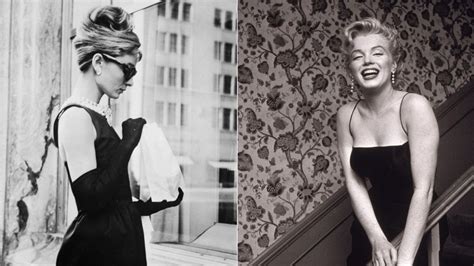chanel black dress history | the little black dress history chanel black dress history The Roaring Twenties were in full swing when Vogue featured on its cover the first “little black dress” designed by Coco Chanel and ushered in the long reign of a fashion staple. 1 DanceDanceRevolution (2013) 1.1 Release Information. 1.2 General Information / Changes. 1.3 Staff Information. 2 Full Song List. 3 Default Songs. 4 EXTRA STAGE. 4.1 TAG seitansai. 5 Unlocks. 5.1 ENJOY LEVEL Unlocks. 5.2 Shiritsu BEMANI gakuen. 5.3 jubeat-GITADORA-DDR no Triple Journey. 5.4 Nettou! BEMANI Stadium. 6 New Charts.
0 · who created the little black dress
1 · the little black dress history
2 · original black dresses
3 · history of black dresses
4 · coco Chanel original dress
5 · coco Chanel black dress history
7.1 System Model. For the purposes of deadlock discussion, a system can be modeled as a collection of limited resources, which can be partitioned into different categories, to be allocated to a number of processes, each having different needs. Resource categories may include memory, printers, CPUs, open files, tape drives, CD-ROMS, etc.
The Roaring Twenties were in full swing when Vogue featured on its cover the first “little black dress” designed by Coco Chanel and ushered in the long reign of a fashion staple.
Black has always been a color rich in symbolism. In the early 16th century, black represented wealth among Spanish aristocrats and Dutch merchants as it was incredibly expensive to produce the black color from "imported oak apples." In the early 18th century, black represented romance and artistry. As Ann Demeulemeester said of it, "Black is poetic. How do you imagine a poet? In a . The Roaring Twenties were in full swing when Vogue featured on its cover the first “little black dress” designed by Coco Chanel and ushered in the long reign of a fashion staple.In 1926 Coco Chanel published a picture of a short, simple black dress in American Vogue. It was calf-length, straight and decorated only by a few diagonal lines. Vogue called it "Chanel's Ford". Like the Model T, the little black dress was simple and accessible for women of all social classes.
Click through to read the fascinating history of the little black dress, including Coco Chanel's LBD to that iconic Audrey Hepburn Givenchy dress.
And the little black dress, or LBD as it is now known, was one such item: based along the lines of a simple chemise dress, Chanel's tended to feature a straight or bateau neckline and hung loosely to the mid or lower calf. Almost a century ago, Coco Chanel unveiled the original little black dress. The 1926 garment would go on to become a fashion staple, so well-known that it is often referred to simply by the.Created by Coco Chanel in 1926, the little black dress was translated to ready-to-wear as a staple of late afternoon and cocktail hours; American women at every level of consumption knew the importance of a practical, "well-mannered black."

In 1926, Coco Chanel designed a simple black dress. It was deemed radical at the time, a freeing shape, in a colour previously associated with mourning. The little black dress may have been introduced by Coco Chanel, but it was Audrey Hepburn who made the garment famous in the film Breakfast at Tiffany's. From Hepburn's Givenchy sheath to.
In October 1926, Vogue featured a sketch of a long-sleeved, calf-length, black sheath dress by a plucky young designer named Coco Chanel. Dubbed “Chanel’s Ford,” the dress was promoted as.
Tracing the bold curve of social history across the 20th and 21st centuries, "Little Black Dress" explores the evolution of a definitive yet democratic style that, for more than a. The Roaring Twenties were in full swing when Vogue featured on its cover the first “little black dress” designed by Coco Chanel and ushered in the long reign of a fashion staple.In 1926 Coco Chanel published a picture of a short, simple black dress in American Vogue. It was calf-length, straight and decorated only by a few diagonal lines. Vogue called it "Chanel's Ford". Like the Model T, the little black dress was simple and accessible for women of all social classes. Click through to read the fascinating history of the little black dress, including Coco Chanel's LBD to that iconic Audrey Hepburn Givenchy dress.
And the little black dress, or LBD as it is now known, was one such item: based along the lines of a simple chemise dress, Chanel's tended to feature a straight or bateau neckline and hung loosely to the mid or lower calf.
who created the little black dress
Almost a century ago, Coco Chanel unveiled the original little black dress. The 1926 garment would go on to become a fashion staple, so well-known that it is often referred to simply by the.
Created by Coco Chanel in 1926, the little black dress was translated to ready-to-wear as a staple of late afternoon and cocktail hours; American women at every level of consumption knew the importance of a practical, "well-mannered black."In 1926, Coco Chanel designed a simple black dress. It was deemed radical at the time, a freeing shape, in a colour previously associated with mourning. The little black dress may have been introduced by Coco Chanel, but it was Audrey Hepburn who made the garment famous in the film Breakfast at Tiffany's. From Hepburn's Givenchy sheath to.
In October 1926, Vogue featured a sketch of a long-sleeved, calf-length, black sheath dress by a plucky young designer named Coco Chanel. Dubbed “Chanel’s Ford,” the dress was promoted as.
the little black dress history
Administration Address: Višķu St.17, LV-5410 Daugavpils, Latvia GPS coordinates: 55.895023, 26.546120 Phone: + 371 654 02333 Fax: +371 654 45101 Email: [email protected] Reg. No. 40003030187 VAT No. LV40003030187 Chairman of the Management Board - Raimonds Bruzevics Bank account details BluOr Bank AS A/C number: .
chanel black dress history|the little black dress history



























